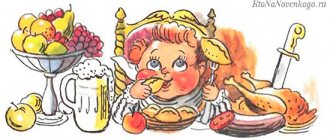Audio version of the article
- “Do not store up treasures for yourself on earth...” A. G. Dolzhenko
- Punished greed for profit, prot. Victor Guryev
***
Greed – 1) a feeling of thirst for acquisition, profit, excessive consumption of any goods; 2) stinginess. This word is synonymous with such concepts as greed, greed, and gluttony. Sometimes, however, not all philologists agree with this; it is used as a synonym for the word “chrematistics”. In the figurative sense of the word, a strong or even passionate desire for something, deep interest in something.
Pride, or “the sin of Lucifer”
Find out what awaits you today - Horoscope for today for all zodiac signs
Pride is considered one of the most serious sins, as it originated from Satan himself. The history of this sin goes back to the creation of the angelic world. One of the highest angels and the most powerful, Dennitsa, did not want to be in obedience and love for the Lord. This Angel became extremely proud of his strength and power and wanted to become equal to God. Dennitsa carried away many Angels with her, which is why a war was unleashed in heaven. Archangel Michael, together with his Angels, fighting Satan, won victory over the evil army. Satan-Lucifer, like lightning, fell from the kingdom of Heaven into the underworld. Since then, hell, the underworld, has been the habitat of dark spirits, a place devoid of God's grace and light.
A person who is sinful of pride is the successor of Lucifer’s work on earth. Pride entails all other sins, even those that are not included in the list of the seven mortals.
Pride is excessive faith in oneself and one’s capabilities, which conflicts with the greatness of the Lord. A person in such sin boasts of his qualities, forgetting about the one who gave them to him. Simply put, pride is extremely inflated self-esteem, exaltation of one’s real qualities and imaginary good traits. This is inflated self-esteem. In such cases, a person believes that he is better than he really is, and better than all other people. This leads to arrogance and arrogance. This is a biased assessment, selfishness, which leads to making terrible mistakes in life. This is self-praise, blind self-worship. A component of pride is also hostility towards others.
Due to numerous requests from readers, we have prepared an “Orthodox Calendar” application for smartphones. Every morning you will receive information about the current day: holidays, fasts, days of remembrance, prayers, parables. Download for free: Orthodox Calendar 2022 (available on Android)
One of the effective ways to overcome pride is to serve society, the Lord and family. By giving oneself to others, a person can change.
Pride is the source of negative thoughts and emotions. These things have a detrimental effect on a person’s psychological state and behavior. Too much self-importance gives rise to aggression towards the world around us.
The sin of love of money is equal to distrust of God
Trust in the Creator is based on faith, hope and love.
By acquiring wealth, which the sinner is afraid of losing, he loses hope in the Savior, and trusts only in money, with which he hopes to solve everything, but at the same time:
- faith in the Almighty disappears that He can come to the rescue at any moment;
- the recognition of the sacrifice of Jesus Christ, which He paid for all our needs, completely evaporates;
- love for one’s neighbor, from whom there is no self-interest, dissolves in gold.
For a money lover, it is not the Creator, but money, that is the only lifeline in a critical situation, but life says the opposite . No amount of wealth can save you from a plane crash or an explosion in a shopping mall, there is not enough gold on earth to ransom a cancer patient, only Jesus can do all this.
Not trusting God with the future, the money lover saves for a “rainy day,” turning not only his own life, but also the lives of his loved ones into a constant “rainy” day.
The Orthodox Church condemns the sin of love of money
The little dragon sitting inside the believer named love of money is not visible to anyone, but it nullifies diligent prayer rules, pilgrimages to shrines, strict fasts and other visible manifestations of Christianity.
Try asking such a Christian to make a donation for a church, Sunday school, or simply for the operation of a loved one. At such moments the whole essence of a true believer will be revealed. A money lover does not know how to love anyone or anything except money.
Alexander the Great owned half the world, but ordered himself to be buried with an open palm, showing that nothing could be taken with you after death, which could occur at any moment.
Greed
The second major sin in Christianity. Greedy is a greedy or stingy person who is inclined to increase his wealth. This sin is divided into the desire to receive more than a person already has - greed and reluctance to lose what he has, the desire to preserve it - stinginess. Greed stirs up internal illnesses such as fear and anger. A person, going over his head, using his comrades, regardless of the opinions of others, obtains for himself those benefits that are dear to him. A person in such sin puts money and material wealth first in his life, preferring them to spiritual values. The sinner is often willing to spend most of his time counting his existing wealth. If suddenly his wealth is lost, then such a person will feel emptiness in his soul, the meaning of life will be lost.
The life of such a person is often accompanied by anger. This is a natural feeling for a greedy person. He is not interested in anything except material gain. The spiritual emptiness of such a person is filled with money or things. The root of this vice is a feeling of insecurity, danger, instability.
The main problem of greed in religion and psychology is considered to be the degradation of a person’s personality. The individual simply wants to be happy and believes that he will achieve this through the preservation and accumulation of material things. The feeling that the more you have, the happier you will be. But due to the fact that such things are not pleasing for a long time, you have to purchase them again and again.
The reason for the sin of love of money
The reasons for the emergence of a passion for enrichment among Christians are:
- uncertainty about the future;
- lack of feeling of security;
- distrust of the Creator;
- the desire to become recognized and respected.
The Apostle Paul describes the love of money as the root of all sins (1 Tim. 6:10), on the basis of which pride and exaltation grow.
The love of money is the root of all sins
Lucifer, possessing everything, being near God, became proud, wanting more, and was thrown to earth and hell.
Adam and Eve were given the whole world except the tree of knowledge. This turned out to be not enough for them, and they lost everything.
A proud heart, which is born from the love of money, is the cause of the fall of many Christians. Not all proud people are lovers of money, but all lovers of money become proud.
Important! The desire to acquire, accumulate wealth by any means can drive love out of the most faithful heart, and open the doors to hatred, uncertainty and fear.
About spiritual life:
- How to fast on Wednesday and Friday
- How to properly cleanse and consecrate a house using a church candle
- What prayers should be read before confession and communion?
Envy
This sin is also prohibited by the Ten Commandments. A person in this sin wants to have something that does not belong to him. The objects of envy are both material and spiritual things. According to religion, God gives everyone what this particular person needs in accordance with the Lord’s plan. And the desire to have what the Lord has given to another contradicts and strives to carry out personal will in defiance of God’s. Despite the fact that envy is one of the seven deadly sins, and the fact that this vice causes a person a lot of trouble and trouble, envy still lives in everyone, and it has not been possible to get rid of it.
Every person is susceptible to this sin to some extent. This is explained by the fact that everyone has a certain number of needs and needs, which he often cannot satisfy in his own life, but sees them in other people. In addition, it is much easier to explain your shortcomings and mistakes not by your problems (laziness or weakness), but by the mistakes and injustice of fate, which, for some unknown reason, benefits someone else and not us.
There are many examples of envy in human history. In the Bible, these are the brothers Cain and Abel, selling Joseph into slavery because of the love of their father. A parable about King Saul and defenseless David. The entire life path of Jesus Christ was accompanied by human envy. Using examples from the New and Old Testaments, one can understand that for a long time, envy filled the souls and hearts of people.
Method of combating sin/passion of greed in Orthodox asceticism
Holy Scripture testifies that greed/greed is one of the most serious sins, and if it takes root in a person, it is one of the most serious passions. In particular, “No one can serve two masters... <...> You cannot serve God and mammon” (Matthew 6:24), “and again I say to you: it is easier for a camel to go through the eye of a needle than for a rich man to enter the kingdom of God.” (Matthew 19:24) (however, it should be noted here that although it is greed (along with other qualities, of course) that often contributes to a person’s accumulation of wealth, wealth is not an absolute indicator of a person’s inability to live in the Kingdom of Heaven). Greed does not allow a person to completely submit to the will of God and worship Him in purity of heart. Greed is an integral component of other vices: love of money (essentially, greed for money), greed (thirst for profit, personal gain, usually contrary to the public good), acquisitiveness (hoarding in principle, in a specific application usury), covetousness (the same , which is greed, but also has non-material connotations, for example, a passion for sinful pleasures), hoarding (this concept is close to the concept of stinginess), money-grubbing (useless hoarding, “plushkinism”), bribery (bribery, more broadly, passion for unjust acquisition wealth).
According to Rev. To John Climacus (525–595 (605) or 579–649), the passion of greed (like many other holy fathers, he considers not so much greed as such as the love of money) is opposed by the virtue of non-covetousness. Non-covetousness is a tool in the fight against greed. Non-covetousness is achieved through voluntary renunciation of property and hoarding, through fasting and prayer, through obedience to a spiritually mature, experienced mentor (“Those who remain in obedience are alien to the love of money; for when they have betrayed their body, what will they consider their property?”), and also through “contempt,” that is, devaluation of the object of greed (“He who despises the substance has gotten rid of justifications and contradictions; the covetous is ready to compete to the death for a needle”).
Non-covetousness as an ascetic practice is the core of a certain spiritual feat in Orthodox asceticism - lack of money. Also in Orthodoxy, there is a special rank of saints who distinguished themselves in this feat of voluntary renunciation of material goods, money, as well as selflessness and non-covetousness in their service to others - unmercenaries (ancient Greek ἀνάργυροι).
In some cases in the history of the Church, non-covetousness and lack of money reached the socio-political level. A striking example of public discussion and non-acquisitiveness as the basis of a socio-political movement is “non-acquisitiveness” - a monastic movement in the Russian Orthodox Church at the end of the 15th - first half of the 16th century.
Notes:
Saint Gregory Palamas. Conversation for the 15th Sunday of the Gospel readings according to Luke, which has as its theme the correction and salvation of the chief tax collector Zacchaeus // Conversations (omilia).
Metropolitan Hilarion (Alfeev). Life and teaching of St. Gregory the Theologian.
Saint Gregory the Theologian. Greed // Symphony based on the works of St. Gregory the Theologian.
Venerable John Climacus. Word 16. About the love of money // Ladder or Spiritual Tablets.
Venerable John Climacus. Word 17. About non-covetousness // Ladder or Spiritual Tablets.
Right there.
Anger
This mortal sin is a manifestation of the “irritable” part of the soul. God gave rational anger to man as a weapon; it is the power of the soul with which man resists evil. As a result of the Fall, this rational power is perverted and becomes the most terrible vice for the individual. Anger has many varieties. It has the appearance of a serpent that produces young that are more dangerous and poisonous than itself. These children are: envy, jealousy, rancor, rage or hatred and rancor. All these traits make a person and his loved ones unhappy. We combine this sin - anger - with other passions, in which case a wide variety of vices appear.
Anger with stinginess creates a negative attitude towards the poor and poor. The sinner looks at such a person as if he were an aggressor who is encroaching on his property. He will call them deceivers and idlers.
Anger combined with sadness gives rise to frustration and irritability, dissatisfaction with everything and everyone around.
Anger and despondency give rise to ardent hatred, contempt for life itself, often even aggressive atheism. This condition can often be a reason for committing suicide.
Anger combined with vanity can give rise to vindictiveness and envy. For such a sinner, the enemy will be the person who has surpassed or been ahead of him in some way. A person in sin is ready to use the most disgusting and base means to harm his “enemy”: slander, denunciation, caustic ridicule.
Pride combined with anger creates hatred towards humanity.
Lust or fornication
According to the dictionary, lust means sexual desire, rough and voluptuous. In Christianity, lust is “an unlawful passion, corruption of hearts, leading to evil and sin.” Lust and sin are closely related to each other, as stated in the letters of the apostles, which form part of the New Testament. Lust or, as this sin is also called, fornication is not equivalent to the word love. The latter implies a bright feeling directed at the object of one’s interest. The fundamental components of these feelings were and remain respect and the desire to selflessly do something nice for your partner. Love is not combined with selfishness, due to the fact that it is initially aimed at sacrifice.
A person who is subject to this sin cannot be concentrated on anything else. The sinner is in the grip of passion. He looks at women as if a lady is an object of passion and satisfaction of animal desires, and nothing more. Dirty thoughts, filling his consciousness and darkening his soul, clouds them.
A lustful person constantly remembers his animal desire and passions; these feelings do not leave him. Because of this, the sinner constantly wants those who do not care about him and who, in essence, do not need him, and if they do need him, then the sinners will chase him, looking for new pleasures, trampling and humiliating the feelings of another. This is due to the fact that lust and fornication are based only on sexual desire, which is not combined with respect and holiness of feelings.
Types of love of money
Sinful love for wealth manifests itself in different forms, sometimes the most unexpected. People of different incomes and social levels are susceptible to this passion. And it would be wrong to consider only the rich and successful as such, as if their condition were an indicator of this passion. A poor man sometimes clings more tightly to his last coin than another to his millions. And that is why the contribution of the poor widow from the Gospel stories, who gave everything she had, was so dear to the Lord.
The love of money includes a whole bunch of varieties of sin:
- covetousness;
- selfishness;
- stinginess;
- greed;
- extortion;
- fraud;
- perverse gain;
- self-interest;
- greed;
- selfish benefit;
- speculation;
- other.
Each of the listed points means a specific manifestation of sin, but all these definitions are related.
Stinginess
This is an extreme manifestation of greed, a painful reluctance to part with anything that goes beyond normal generally accepted norms. Greed is the insatiable desire to get as much as possible, while stinginess is aimed at spending as little as possible.
Covetousness
The sin of idolatry is when all worries are aimed at acquiring property, leaving no time and energy for God. It leads to the violation of almost all of His commandments, when the interests and benefits of other people are betrayed for the sake of profit, and the law of love for one’s neighbors is violated.
Mshelomystvo
It is used primarily in cases when we are talking about bribes, love of gifts, collecting, the presence of unnecessary things in everyday life, and the like. The reason often lies in pride, vanity, and lack of faith.
Selfishness
It is used when it comes to individuals who do nothing for others without their own benefit. Such people will not lift a finger for the benefit of another person for free. They are distinguished by the desire to obtain profit in any way, indiscriminateness in the means of profit, which leads to violation of civil and Divine laws.
Gluttony
Gluttony is also often called gluttony. This sin is a kind of addiction to overeating in excess of the norm. This also includes drinking. Gluttony is considered one of the main sins in Christianity. This kind of sin disfigures both the soul and the person himself. This is due to the fact that an overly full belly often plunges the consciousness into a dark slumber, devastates it and makes it lazy, the latter being another item on the list of mortal sins.
A person who is subject to the sin of gluttony cannot conduct rational discussions on spiritual topics, nor can he comprehend anything deeply enough. The womb of such a person is like a lead weight, which pulls down the soul, grounded by vices and sins.
Religion has many ways of getting rid of this sin: prudence, the content of fasting, and the memory of the Supreme Court, the predominance of the spiritual over the material.
A glutton is a person who lives for his stomach. All plans and desires are aimed at food. The sinner lives and works for the purpose of acquiring a variety of food. Lonely people with such sin are often selfish. If the sinner is bound by marriage and family life, it will be a disaster for the whole family.











